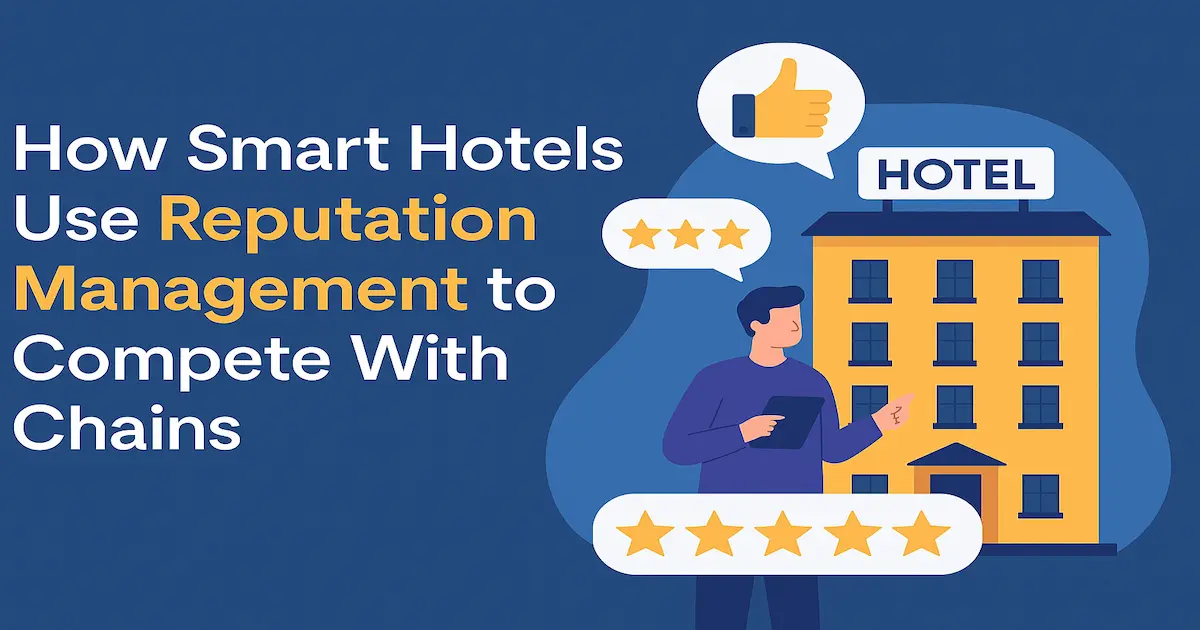In the hospitality industry, trust is everything. A good name can lead to an increase in bookings while a bad reputation can empty rooms. For independent hotels, their name is their brand.
They don’t have the luxury of global recognition like major chains. What they do have is a chance to build strong trust through positive guest reviews and guest satisfaction.
Today, online reviews are one of the most important parts of a guest’s booking decision. People check ratings before choosing where to stay. Smart hotels know that online reputation is more than just stars; it’s a signal of quality and experience.
Lets get started!
Independent Hotels vs. Major Chains: The Competitive Landscape
Independent hotels often compete with chains that have large budgets and loyal customer bases. Big hotel chains enjoy benefits like global marketing, pricing strategy, and established brand identity. These advantages can make it tough for smaller hotels to stand out.
However, independent properties can still win. By using authentic branding, personalized service, and strong reputation management strategies, they can create unique value. Value-driven hospitality and personalized guest experience are powerful tools in their hands.
The Challenges of Competing Without a Big Brand Name
Without a big name, independent hotels face issues like low brand perception, fewer direct bookings, and weaker referral rates. They also struggle with performance benchmarking against large brands and may miss out on premium OTA rankings.
On top of that, smaller marketing budgets make it hard to reach new customers. But this is where reputation management tools come in. With the right online tactics and guest feedback systems, they can gain attention and build loyal guests.
Building a Trustworthy Identity Through Brand Storytelling
Hotel storytelling builds emotional connection. Instead of just advertising rooms, smart hotels share their story—who they are, what they offer, and why they matter. This can include local storytelling about the building, the staff, or the area.
Read More: Markisetepp: The Future of Smart Outdoor Fabric Design
Authentic branding makes guests feel something. Emotional connections matter in travel. They help turn one-time guests into repeat visitors. This type of emotional branding creates lasting impressions that big brands can’t always match.
Guest Experience as a Reputation Driver
Nothing beats good service. A smooth guest experience often leads to positive guest reviews. Whether it’s fast check-in, clean rooms, or friendly staff, every moment counts. Collecting guest reviews and listening to feedback helps hotels fix problems quickly.
Offering a personalized guest experience builds trust. This includes remembering names, preferences, and birthdays. When guests feel known and cared for, they share it in their review responses.
Digital Strategies That Shape Perception
Online presence is everything. That means keeping websites updated, listings accurate, and responding to reviews. A smart reply to a bad comment can fix a bad first impression. These review response tactics help manage negative feedback.
Digital guest feedback forms also help track problems before they go public. Use sentiment analysis to learn how guests feel and make changes in real time.
Table: Review Response Example
| Scenario | Bad Response | Good Response |
|---|---|---|
| Late check-in issue | “It happens, sorry.” | “We’re sorry for the delay. We’re improving the process to serve you better next time.” |
| Dirty room complaint | “Not our fault.” | “We apologize. We’ve talked to housekeeping and will make sure it’s clean next time.” |
Leveraging Social Media to Strengthen Guest Relationships
Using social media for hotels keeps them connected with guests before, during, and after their stay. Platforms like Instagram, Facebook, and TikTok are great for sharing stories, showing rooms, and giving updates.
Engaging with guests online also builds loyalty. When guests tag a hotel in a post, the hotel should reply. These direct guest interaction moments boost trust and increase guest retention.
Smart Tech Tools That Enhance Reputation Management
There are many reputation management tools that help track guest sentiment. Tools like hotel CRM platforms store guest details and make follow-ups easy. Automated reputation tools collect and respond to reviews quickly.
Other helpful tools include brand monitoring systems, which alert managers to new reviews, and feedback apps that gather real-time feedback. These tools are important for performance benchmarking and staying ahead of problems.
From Reviews to Revenue: How Reputation Impacts Profits
More than 90% of travelers read online reviews before booking. Good reviews lead to higher direct bookings and better OTA rankings. When guests are happy, they spend more, return again, and tell friends.
A good reputation improves the bottom-line impact of the hotel. Hotels with strong reputations can charge more without hurting bookings. That means higher guest loyalty and better hotel revenue growth.
Table: Reputation vs. Revenue
| Reputation Score | Booking Rate | Avg. Room Rate | Referral Rate |
| 4.8 | High | $$$ | High |
| 4.0 | Medium | $$ | Medium |
| 3.0 | Low | $ | Low |
Final Thoughts: In Hospitality, Reputation Is the Ultimate Luxury
In the world of hospitality, guest communication & social engagement matter more than marble floors or fancy rooms. A good name builds a stronger business than ads ever could. For independent hotels, focusing on guest feedback, review responses, and creating an amazing guest experience is the key to success.
By using the right reputation management strategies, smart hotels can not only survive but thrive against the big chains. In the end, reputation is more than what people say online. It is a sign of trust, care, and value.
FAQs
What is hotel reputation management?
Hotel reputation management is the process of monitoring, analyzing, and improving how a hotel is viewed online. This includes responding to reviews, collecting guest feedback, and using reputation management tools to understand guest sentiment.
How do smart hotels manage their reputation?
Smart hotels use sentiment analysis, real-time feedback, and social engagement. They rely on tools like hotel CRM platforms and brand monitoring to track mentions and reviews. They also make sure to answer all guest concerns online.
Why is reputation important for independent hotels?
For independent hotels, reputation is everything. They don’t have brand recognition like chains. So, strong online reviews and good guest experiences help them win over new guests and grow their business.
Can reputation affect bookings and revenue?
Yes. A better reputation leads to more direct bookings, higher prices, and increased guest loyalty. It also improves referral rates and overall hotel revenue growth.
What tools help with reputation management?
Some helpful tools include automated reputation tools, brand monitoring systems, digital guest feedback forms, and feedback apps. These help hotels respond faster and improve their service.












